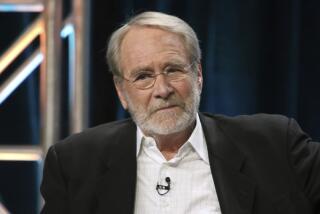From the Archives: Robert Mitchum, Durable Movie Star for 40 Years, Dies
Robert Mitchum, filmdom’s monosyllabic, devil-may-care tough guy whose lizard-lidded eyelids seemed to be forever looking down on a world he found both amusing and profane, died Tuesday at his home in Santa Barbara County. He was 79.
Mitchum, frequently seen in films and photos with a cigarette dangling from his lips, died in his sleep of complications from emphysema and lung cancer, said his biographer and friend Jerry Roberts.
Mitchum had led a wild life seldom seen in the dollar-conscious world of latter-day Hollywood where actors are bound to obedience by the immense cost of their films. Over the years he continued to waver between the wildness of his youth and the somnolent success of his middle years, sometimes existing on a diet of tequila and milk, other times wrapping himself in the love of his family, where he judged himself “a poor husband and a good father.”
The unpredictable actor, who had continued working until recently, was still capable of striking women speechless well into his 70s. And he accepted most of the adulation with a grace and charm he seldom exhibited on the screen, kissing his female fans on the cheek as they rushed up for a kind word and an autograph.
At 6 feet, 1 inch and barrel-chested, Mitchum swaggered through more than 125 feature pictures, starting with a mediocre Hopalong Cassidy Western and climaxing in powerful performances in the acclaimed TV miniseries “The Winds of War” and its sequel, “War and Remembrance,” based on the Herman Wouk novels.
Then-Paramount TV division President Gary Nardino said Mitchum was the lone actor considered for the central character of Navy Capt. Pug Henry in that epic. “He’s the only Gary Cooper still alive.”
By the end, Mitchum had found stardom in such praised performances as “Thirty Seconds Over Tokyo,” “The Story of G.I. Joe,” “Till the End of Time,” “Out of the Past,” “Thunder Road,” “The Night of the Hunter,” “Heaven Knows, Mr. Allison,” “Ryan’s Daughter,” “Farewell, My Lovely” and several more.
Conversely, there were such classically forgettable films as “Five Card Stud,” “The Angry Hills,” “Young Billy Young,” “Secret Ceremony” and more.
Marijuana Arrest
Mitchum himself once summed up his lengthy, rewarding and diverse career by saying in his inimitable manner: “It sure beats working.”
Although one of film’s true superstars and a leading man for four decades, he never was accorded the most cherished insignia of his craft, the Academy Award. He was nominated for an Oscar for his portrayal of Lt. Walker in “The Story of G.I. Joe,” which many considered his finest performance. But he remained a bridesmaid and not a bride, unlike such contemporaries as Humphrey Bogart and Spencer Tracy.
A headline over a Mitchum article in the New York Times many years ago read: “Mitchum, a Character in Search of a Jail.” It was a phrase that could have been applied to many aspects of his personal life, for the then-beginning actor had shocked the world in 1948 when he was arrested for smoking marijuana with a starlet in her Los Angeles apartment.
Pictures of a sullen Mitchum being booked into jail were displayed on newspapers’ front pages across the country.
Yet, although marijuana was considered the epitome of drug abuse, he emerged from two months of prison to find his career not only intact but his talent in greater demand.
If he had learned to be penitent, it didn’t show. He told reporters upon his release that “jail is like Palm Springs without the riffraff. A great place to get in shape, only you meet a better class of people.”
Although his career quickened and broadened, one thing never changed: his iconoclastic approach toward life and art exemplified particularly when confronted by interviewers. He generally answered all questions by spinning webs of lies, interspersed with self-deprecating remarks. He then crafted these in language he knew could never be printed.
He was, wrote his friend and co-star Deborah Kerr in a Mitchum film anthology, used to expressing himself “in a totally unrepeatable language.”
He gloried in outrageous inconsistency and in one period in the 1970s served up three places of birth to a like number of questioners.
What’s acknowledged by researchers and film historians is that he came into the world as Robert Charles Duran Mitchum on Aug. 6, 1917, in Bridgeport, Conn., the son of a Norwegian-born mother and an Irish-Scots railroad worker prone to brawling when he wasn’t working.
Robert was 18 months old when his father was caught between two freight cars and crushed to death. His mother, who was pregnant at the time, spent the next 10 years supporting her three children (Mitchum was the middle child) before remarrying a dashing Englishman she had met while working at the Bridgeport newspaper.
The upheavals at home were believed to be the beginnings of young Mitchum’s hostility that began to surface in a series of schoolyard brawls. In one he received the broken nose that developed into his angular trademark.
“They used to say to me,” he told the St. Petersburg Times in 1993, “did you ever think about getting your nose fixed.” And then he fell back on one of his standard interview lines:
“I had it fixed three or four times--by a straight left!”
He left home when he was barely 15, according to “Robert Mitchum: A Biography,” written by George Eeels and published in 1984.
He worked as a deckhand on a salvage ship and then decided to join his sister Julie in Long Beach. En route he hitchhiked through Georgia, where he supposedly was arrested on a robbery charge and sent to a chain gang. Mitchum varied the length of his imprisonment with each telling but claimed to have escaped and fled to California where he drove trucks and washed dishes.
When work ran out, he returned to the East Coast and met the woman he was to marry--Dorothy Spencer--who had been dating his brother.
Despite Mitchum’s acknowledged infidelities and his penchant for problems, the marriage endured 57 years and produced three children, James, Christopher and Petrina, and seven grandchildren.
Mitchum again took off for California, where his sister had begun acting with the Players Guild of Long Beach. It was on the sands of that city that he began experimenting with marijuana.
Mitchum, a childhood poet who by then was writing material for his sister’s nightclub act, was hired as an assistant by astrologer Carroll Righter. He revisited his poetic side in the mid-1950s with a calypso record, “Calypso Is Like So,” that was reissued in 1995.
With his 1940 marriage, Mitchum was forced to give up his unrewarding writing jobs and went to work in a defense plant shortly before Pearl Harbor.
But the routine of Lockheed bored him and he and an actor friend registered with the Screen Extras Guild and began to get regular work in low-budget films. He landed a bit part in the 1943 Hopalong Cassidy film “Hoppy Serves a Writ,” and began to appear regularly in the series.
By the end of that year he was portraying a lonely soldier in “The Human Comedy,” based on William Saroyan’s novel. The role launched both his career and his reputation, for he began to be seen hanging out at various Hollywood saloons with fellow iconoclasts.
Mitchum credited his success as an actor to such predecessors as Bogart, who introduced the era of what Mitchum called “the ugly leading man.” The era came after the horrible realities of World War II when the pretty faces of Tyrone Power and Robert Taylor no longer seemed relevant.
Near war’s end, Mitchum was drafted into the Army but spent most of his eight-month service career promoting “G.I. Joe.” Friends said he was bitterly disappointed when he failed to win the supporting actor Oscar, although Mitchum said he didn’t care.
He was now under contract to RKO and made “Till the End of Time,” “Undercurrent” and “The Locket.” But about that time (1946) he found that his business manager had embezzled nearly all his money and Dorothy Mitchum insisted that the family return to the East Coast and Bob give up films.
But RKO quickly insisted that he return and honor his contract. He came back to Hollywood by himself where he admittedly began drinking too much while courting those who could supply marijuana.
Career Honors
His arrest in 1948 in the company of Lila Leeds at first seemed to doom his career, but he emerged from prison to find:
* His wife and family had come back to California to reconcile.
* His latest film, “Rachel and the Stranger,” was attracting huge crowds, most of them curious to see the “dope addict.”
He returned to films a conquering hero and was met by increasing throngs of admiring women whenever he toured to promote such pictures as “The Big Steal” and “Holiday Affair.”
By January 1951 he had completed two years’ probation, the court had expunged the record of his arrest, and he and his family were living quietly in Mandeville Canyon.
Although he never again became the worst of Hollywood’s “bad boys,” he had occasional skirmishes with the law over traffic tickets and the like while continuing to attract the interest of gossip columnists who were either prying into his supposed affair with Shirley MacLaine or following him about the watering holes of the Westside.
Again, he was supposedly disappointed when Deborah Kerr was nominated for a best actress award for “Heaven Knows, Mr. Allison,” but his performance opposite her was ignored.
He was not totally without formal honors, however, winning the 1960 best actor award by the National Board of Review for “The Sundowners,” and in 1983 a life achievement award from the American Theatre Arts.
Late in life he also crafted some final triumphs, among them the ambitious “Winds of War” on TV and “That Championship Season” in film. In 1991 he did a cameo role in the remake of “Cape Fear,” in which he had starred in 1962 with Gregory Peck.
He had survived the critics, the brawls and the problems, had the satisfaction of acting with his sons in a 1985 TV movie of the week and had become one of the nation’s favorite curmudgeons.
He continued to grant interviews and may have even been a little more forthright in his answers.
He had lasted a long time.
Why? he was asked a few years ago.
“I work cheap,” was the typical Mitchum-esque riposte.
More to Read
Start your day right
Sign up for Essential California for the L.A. Times biggest news, features and recommendations in your inbox six days a week.
You may occasionally receive promotional content from the Los Angeles Times.






